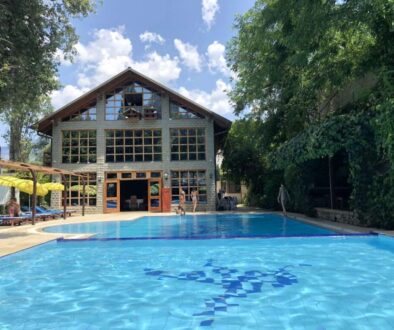Comparing Routes in Urban vs. Rural Settings
In today’s fast-paced world, understanding the dynamics of route planning in different environments is crucial for service-based businesses, particularly in the pool maintenance industry. This blog post delves into the unique characteristics of urban and rural routes, highlighting how these settings influence operational efficiency, customer interactions, and overall business strategy. Whether you’re an entrepreneur looking to invest in a pool route or an existing business owner seeking to optimize your operations, this comparison will provide valuable insights.
The Urban Landscape: Complexity and Connectivity
Urban areas are characterized by their dense populations and intricate networks of roads, which can both benefit and challenge service providers. The high concentration of customers often means that routes can be shorter, potentially allowing for a greater number of appointments in a single day. However, navigating through traffic congestion and adhering to parking regulations can significantly affect service delivery.
One key aspect of urban routes is the variety of residential and commercial properties. Service providers in cities often encounter different pool setups, which may require specialized equipment or knowledge. For example, high-rise buildings may have rooftop pools that necessitate additional safety measures and logistics compared to standalone homes. It’s crucial for pool service businesses to adapt their offerings to meet these unique demands.
Moreover, urban settings typically provide access to a larger customer base and increased visibility, which can enhance marketing efforts. Social media and online platforms allow for better engagement with clients, leading to higher retention rates. According to recent studies, businesses that leverage digital marketing effectively can increase their customer base by up to 30% in urban markets. This is a vital consideration for those looking to buy pool routes in cities.
The Rural Experience: Simplicity and Space
In contrast, rural areas present a different set of challenges and benefits for pool service businesses. With more space between customers, routes can be longer, but the complexity of navigation is generally lower. Fewer customers mean that while the individual service appointments may take longer to complete, the lack of traffic can facilitate smoother travel between them.
Rural routes often require service providers to have a good understanding of the local community, as word-of-mouth referrals can significantly influence business growth. Establishing strong relationships with clients in these areas can lead to a loyal customer base, which is essential for financial stability. In fact, rural service businesses often see a 20% increase in customer retention when they prioritize community engagement.
However, one challenge faced by pool service providers in rural settings is the initial investment in route planning. Unlike urban areas, where businesses can expect a steady flow of new customers, rural routes may require more effort to establish a solid customer foundation. This is where a company like Tower Business Brokers can assist, offering valuable insights into available pool routes for sale that already come with an established customer base.
Comparative Challenges: Traffic and Accessibility
One of the most significant differences between urban and rural routes lies in traffic conditions and accessibility. Urban areas often face daily congestion that can lead to delayed service times and increased operational costs. Service vehicles may sit idle in traffic, wasting valuable time and resources.
Conversely, rural routes typically experience less congestion, leading to more predictable scheduling and the potential for more efficient service delivery. However, businesses must still account for longer travel times between appointments. Route optimization strategies, such as clustering appointments that are geographically close, can mitigate these challenges in both settings.
In urban environments, understanding local regulations regarding parking, noise, and service hours is vital. For instance, some cities have strict ordinances on when services can be performed, which can impact scheduling. Rural areas, on the other hand, may have fewer regulations but can face challenges with road conditions, especially during inclement weather.
Impact on Customer Interactions and Service Delivery
Customer interactions can also differ significantly between urban and rural settings. In urban areas, customers expect quick service and responsiveness. The competition is typically fierce, with multiple service providers vying for attention. This means that businesses must prioritize exceptional customer service to stand out. Utilizing CRM systems can help track customer preferences and service history, enhancing the overall experience.
In contrast, rural customers often appreciate a personal touch. Building trust through face-to-face interactions can lead to long-term relationships and a steady stream of referrals. Customers in these areas value reliability and familiarity—something that can be a game-changer for service providers looking to grow their business.
For pool service professionals, understanding these dynamics is essential. Businesses that can adapt their service delivery models to fit the expectations of their target demographics—whether urban or rural—are more likely to succeed. This includes tailoring marketing strategies and service offerings to meet specific needs effectively.
Best Practices for Navigating Urban and Rural Routes
To effectively navigate the complexities of urban and rural routes, service providers should consider the following best practices:
- Route Planning and Optimization: Use software tools that can optimize routes based on traffic conditions and customer locations. This will save time and reduce operational costs.
- Customer Relationship Management: Implement a robust CRM system to track customer interactions, preferences, and service history. This will enhance customer satisfaction and retention.
- Marketing Strategies: Tailor marketing efforts to suit the local demographic. In urban areas, focus on digital marketing and social media engagement. For rural areas, prioritize community involvement and word-of-mouth referrals.
- Training and Support: Provide comprehensive training for employees to ensure they understand the unique challenges and customer service expectations in both settings. This will empower them to deliver exceptional service.
- Flexibility and Adaptability: Remain flexible in your operations. Urban routes may require quick adjustments due to traffic or scheduling conflicts, while rural routes may need more adaptability in service delivery times.
By understanding and implementing these strategies, pool service businesses can effectively navigate the challenges and opportunities presented by both urban and rural environments.
The Future of Routes: Trends and Innovations
As technology continues to evolve, the future of route management in both urban and rural settings will likely see significant changes. Innovations in routing software, GPS technology, and customer engagement platforms will streamline operations and enhance service delivery.
For instance, the growing use of mobile applications can provide real-time updates to customers regarding service times, helping set expectations and reduce frustration associated with waiting. These tools can be particularly advantageous in urban settings, where time is often of the essence.
Moreover, advancements in electric vehicles and green technologies may influence operational choices for service providers in both settings. As consumers become more environmentally conscious, adopting sustainable practices can serve as a unique selling point for businesses looking to attract eco-minded customers.
In conclusion, understanding the nuances of urban versus rural routes is essential for pool service businesses aiming to thrive in their respective markets. By recognizing the challenges and opportunities inherent in each setting, service providers can tailor their strategies to maximize efficiency and customer satisfaction. For those looking to enter or expand in this industry, exploring available pool routes for sale in Florida and pool routes for sale in Texas can provide a solid foundation for success. Embrace the journey, adapt to the environment, and watch your pool service business flourish.



